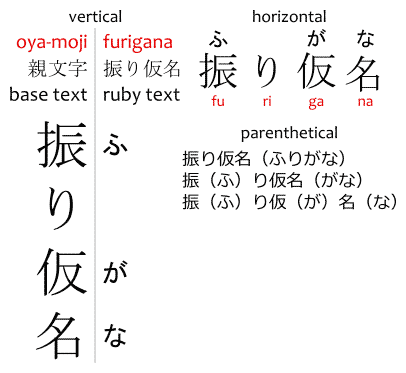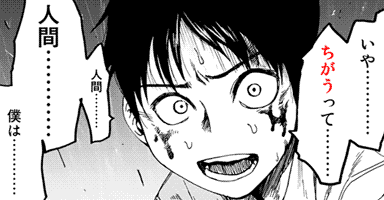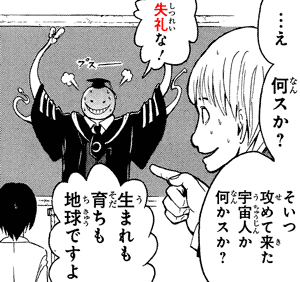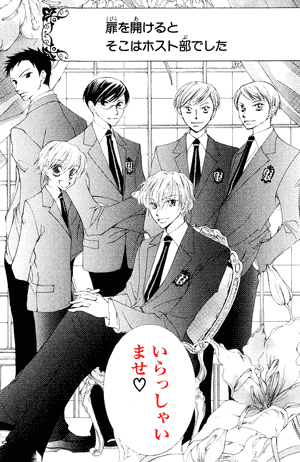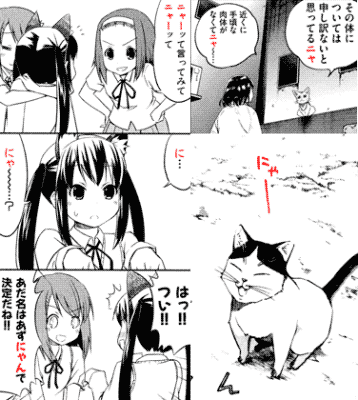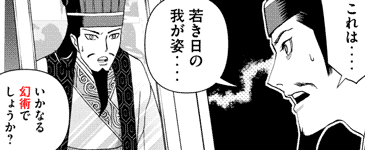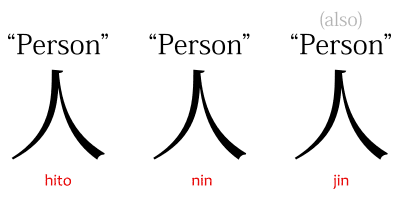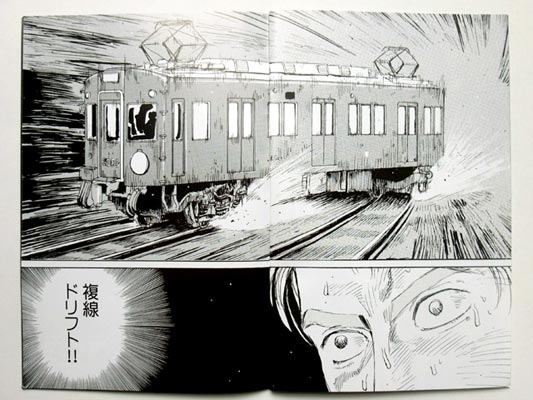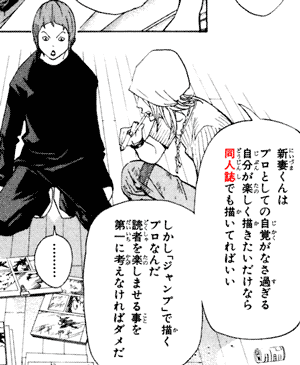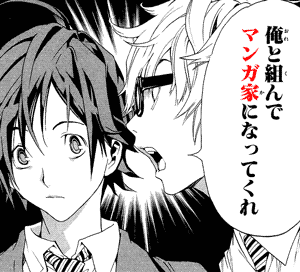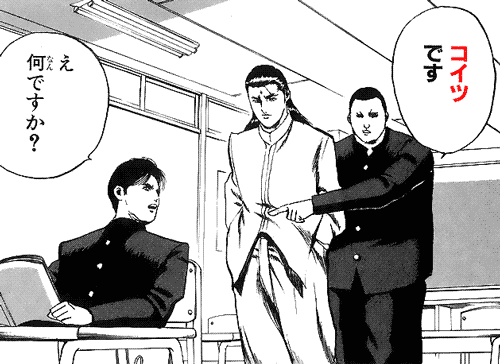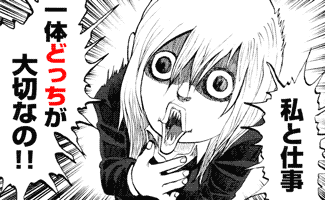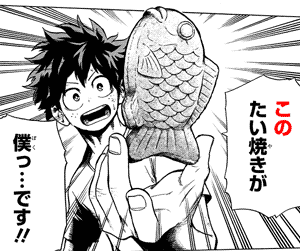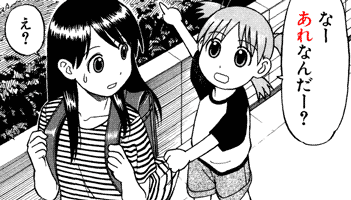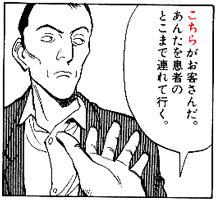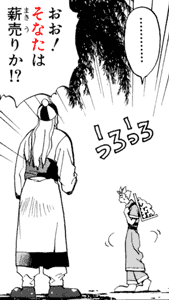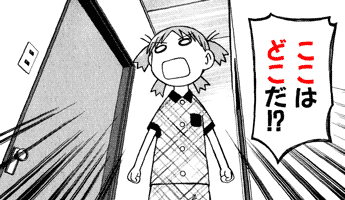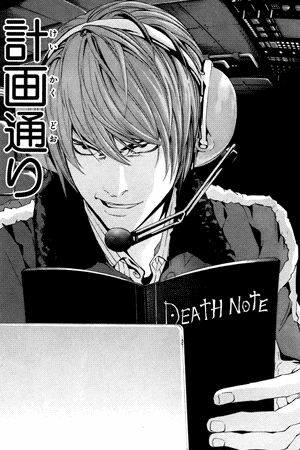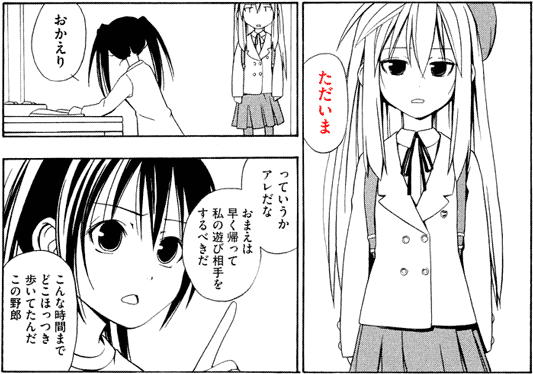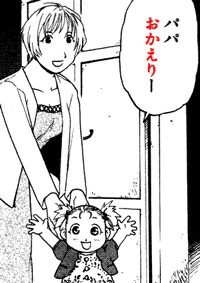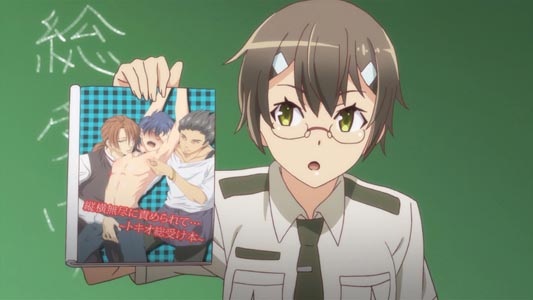On'yomi & Kun'yomi 音読み, 訓読み
kakko カッコ
Names of Sports in Japanese
furigana
In Japanese, furigana 振り仮名 is a text written next to a certain character, word, or phrase, that shows how you're supposed to read it. It's also called "ruby text," rubi ルビ (the opposite being base text), or "reading aid," although it also has some non-reading-aid, creative uses.
For example: 今日日(きょうび) shows the word kyoubi 今日日, "these days," "in modern times," which has kanji 漢字 characters. Inside parentheses is the furigana: k-yo-u-bi きょうび, showing how the word is read using hiragana ひらがな characters.
Fighting Styles in Japanese
Your Name in Japanese - How to Translate and Write
chigau 違う - Meaning in Japanese
In Japanese, chigau 違う means literally "to differ," but it's typically used to say someone got something "wrong," to say it "is different" from what they said, to deny what someone said, i.e. to say "no" in Japanese.
shitsurei 失礼
In Japanese, shitsurei 失礼 means "impolite," in the sense someone has done something impolite, but it can also mean "excuse me," in the sense you've done or are about to do something that may be impolite. (e.g. enter a room, leave a room, etc.)
Ageru, Kureru, Morau あげる, くれる, もらう
Nihon vs. Nippon - Meaning
Nihon and Nihongo - Meaning in Japanese
Request Articles to Japanese with Anime
Post a comment below with your request!
irasshai いらっしゃい
In Japanese, irasshai いらっしゃい, meaning literally "come," is an expression used to welcome someone in a house or establishment. It's an abbreviation of irasshaimase いらっしゃいませ.
To welcome someone in a new place or group, youkoso ようこそ is used instead, and to welcome someone back home, okaeri おかえり is used instead.
Itadakimasu - Meaning in Japanese | 頂きます
ittekimasu 行ってきます
In Japanese, ittekimasu 行ってきます, meaning literally "to go and come back," is an expression used to say goodbye by someone leaving home to go school, work, etc. Whoever remains home bids farewell saying itterasshai 行ってらっしゃい.
When the person returns, they say tadaima ただいま, and are greeted by okaeri おかえり.
itterasshai いってらっしゃい
In Japanese, itterasshai いってらっしゃい, meaning literally "go and come back," is an expression used when saying goodbye to someone leaving home to go to school, work, etc., specially after the person leaving says itte-kimasu 行ってきます.
When they return, they'd say tadaima ただいま, to be greeted with okaeri おかえり.
It's also spelled 行ってらっしゃい.
LN
As for what a light novel is: it's a kind of novel that generally features anime-esque themes and is targeted at teenager and young adult audiences.
light novel ラノベ
nyaa
In Japanese, nya にゃ, nyan にゃん, or nyaa にゃー (also spelled にゃあ and にゃぁ), or "nyah," are onomatopoeia that mean "meow," the sound that cats make. That is, in order to say "meow" in Japanese, one of those words are used.
They can also be spelled with katakana, as ニャ, ニャン, ニャー, ニャア, and ニャァ. And there are other variants, too, like myaa みゃー.
Manga: Doll-Kara, どるから (Chapter 1)
Manga: Nyan Koi! にゃんこい! (Chapter 17)
fanservice ファンサービス
Note that fanservice is way more complicated than just that. It doesn't need to be a "girl" in swimsuit, it can be a guy. The content can be something so specific only men of culture would get it's fanservice, most people wouldn't even realize. It doesn't be a scene, it can be a design. It doesn't need to be anime, there's also fanservice in real life.
Anime: SSSS Gridman (Episode 5, Stitch)
Word for Spoilers in Japanese?
kanojo 彼女, Meaning in Japanese: She, Her, Girlfriend
In Japanese, kanojo 彼女 means "she," "her," a female third person pronoun, or "girlfriend."
It's the female counterpart of kare 彼, "he," "him," "boyfriend."
kare 彼, Meaning in Japanese: He, Him, Boyfriend
In Japanese, kare 彼 means either "he," "him," a male third person pronoun, or "boyfriend," kareshi 彼氏.
It's the male counterpart of kanojo 彼女, "she," "her," "girlfriend."
ninjutsu, taijutsu, genjutsu 忍術, 体術, 幻術 - Meaning in Japanese
In the manga and anime Naruto ナルト, ninjutsu 忍術, taijutsu 体術, and genjutsu 幻術 (also romanized ninjitsu, taijitsu, genjitsu) are similar-sounding terms referring to how the ninjas fight. In this article, I'll explain what they mean in Japanese.
sugoi すごい, 凄い
Third Person Pronouns
The "third person pronouns" in Japanese, san'ninshou daimeishi 三人称代名詞, are a bit complicated.
The words kare 彼 and kanojo 彼女 mean "he" and "she," respectively, but they also mean "boyfriend" and "girlfriend," respectively.
There's no "it" pronoun in Japanese.
Often, someone is referred to in third person neutrally, by the noun phrase "that person," ano hito あの人, ano ko あの子, or aitsu あいつ. Sometimes, by yatsu やつ, which refers to an individual person or thing.
Japanese is a pronoun dropping language, which means there are sentences you'd use "he" or "she" in English that you wouldn't use a pronoun in Japanese.
Why Japanese Can't Speak English?
Kiriban キリ番
人, hito, nin, jin, ~bito, ~ri, ~to
In Japanese, hito, nin, jin, ~bito, ~ri, ~to 人 are different readings of a same kanji, and the meaning of that kanji is "person," so hito, nin, jin, etc. all mean "person" in one way or another. In this article, I'll explain the differences between them and how they're used.
(don't mistake 人 with 入火六大犬水氷木本夫矢天来美奏欒爨, none of which have anything to do with it.)
Counting in Japanese
- Counting to 10 in Japanese
- Counting to 10 Things in Japanese
- What are Japanese Counters
- Using Counters
- Counting Items
- Counting Ordinals
- Counting People
- Counting Days
- Counting Long Cylindrical Objects
- Counting Occurrences
- Counting Floors
- Counting Drinks
- Counting Machines and Vehicles
- Counting Points
- Counting Shots
- Counting Small Animals
- Counting Large Animals
- Counting Other Things
Japanese Numbers - Ichi, Ni, San
natsu, haru, fuyu, aki 夏, 春, 冬, 秋
usui hon 薄い本
In Japanese, usui hon 薄い本, meaning literally "thin book," is an anime slang that refers to a doujinshi 同人誌, often, but not necessarily, a doujinshi featuring adult content, i.e. hentai 変態.
saakuru サークル
This is about the katakanization of "circle," which is used in a different way from English, i.e. it's wasei-eigo 和製英語. The word for a geometric "circle" in Japanese is maru 丸.
doujinshi 同人誌
In Japanese, doujinshi 同人誌 means a "fanzine," an indie manga 漫画, which may or may not be a derivative work, a parody featuring characters whose copyright is owned by someone else. It's also romanized dōjinshi, dojinshi, douzinsi, dōzinsi, or dozinsi.
Photo source: やまひで's blog, 同人ゲーム「地主一派 電車でD LightningStage」で遊んでみた - type-y.com, accessed 2019-01-09.
doujin 同人
In Japanese, doujin 同人, meaning literally "same people," refers to people who have the same hobby as you. In anime and manga, doujin refers to indie manga, anime, games, etc., and their creation, as opposed to mainstream works.
The word doujin is also romanized douzin, dōjin, or dōzin.
mangaka 漫画家
manga - Terminology
In Japanese, manga 漫画 means "comics," as in drawings with speech balloons, it doesn't matter if the comics are Japanese, Korean, American, etc. In English, manga refers only to Japanese comics or artwork in the manga style. The word is also spelled まんが, マンガ.
kosoado kotoba こそあど言葉
koitsu, soitsu, aitsu, doitsu
In Japanese, koitsu, soitsu, aitsu, doitsu こいつ, そいつ, あいつ, どいつ mean "this one," "that one (near you)," "that one (far from us)," "which one?" They're kosoado words that refer to individual items, and, sometimes, to people.
These words have nothing to do with itsu 何時, which means "when," or itsuka 何時か, "sometime."
kou, sou, aa, dou - Meaning
In Japanese, kou, sou, aa, dou こう, そう, ああ, どう mean "this manner," "that manner (near you)," "that manner (far from us)," and "what manner?" They're kosoado words referring to manner.
konna, sonna, anna, donna
In Japanese, konna, sonna, anna, donna こんな, そんな, あんな, どんな mean "like this [thing]," "like that [thing] (near you)," "like that [thing] (far from us)," and "like what [thing]?" They're kosoado words referring to how things are, or the appearance of things.
kocchi, socchi, acchi, docchi - Meaning in Japanese, Usage Examples, Grammar
In Japanese, kocchi, socchi, acchi, docchi こっち, そっち, あっち, どっち mean "this way (toward me)," "that way (toward you)," "that way (away from us)," and "what way?" respectively. They're kosoado words related to direction, but they can also refer to sides, choices, and people.
The words kochira, sochira, achira, dochira こちら, そちら, あちら, どちら work the same way in some cases, but they're considered to be more polite.
kono, sono, ano, dono - Meaning in Japanese
In Japanese, kono, sono, ano, dono この, その, あの, どの mean "this," "that," and "what." They're kosoado words very much like kore, sore, are, dore これ, それ, あれ, どれ, except they're used as adjectives instead of as nouns.
The words sono その and ano あの are also interjections. The word dono どの after someone's name is the honorific dono 殿.
kore, sore, are, dore - Meaning in Japanese, Usage Examples, Grammar
In Japanese, kore, sore, are, dore これ, それ, あれ, どれ mean "this thing (near me)," "that thing (near you)," "that thing (away from us)," and "what thing?" They're kosoado words that refer to things in general.
Sometimes, are? あれ? is an interjection of doubt: "huh?"
kochira, sochira, achira, dochira
In Japanese, kochira, sochira, achira, dochira こちら, そちら, あちら, どちら mean "this way (toward me)," "that way (toward you)," "that way (away from us)," and "what way?" respectively. They're kosoado words related to direction, but they can also refer to sides, choices, and people.
The words kocchi, socchi, acchi, docchi こっち, そっち, あっち, どっち are abbreviations of kochira, sochira, achira, dochira. They're used the same way in some cases, but they aren't considered as polite.
konata, sonata, anata, donata
In Japanese, konata, sonata, anata, donata こなた, そなた, あなた, どなた are kosoado words related to direction, and then to person. They're a bit odd, because donata means "who," anata あなた is one of the various way to say "you" in Japanese, and the rest is archaic.
In various ways, they're similar to the words kochira, sochira, achira and dochira.
koko, soko, asoko, doko
In Japanese, koko, soko, asoko, doko ここ, そこ, あそこ, どこ mean "here," "there (near you)," "over there (not near you)," and "where?" They are kosoado words related to place.
keikaku doori 計画通り
Well, I don't know what you expected but it, yeah, sure, you can translate keikaku doori 計画通り as "all according to the plan," and, yes, indeed, keikaku 計画 means "plan" in Japanese. The word doori 通り, however, is a little more complicated to explain.
Cat Boy (Anime Character Type)
In manga and anime, a cat boy is a character that has cat-like features, such as feline body parts—"cat ears," nekomimi 猫耳, "cat eyes," nekome 猫目, "cat mouth," nekoguchi 猫口, and a "cat tail," neko-shippo 猫しっぽ—and ending their sentences in nyaa にゃー, "meow."
Anime: Uchi Tama?! Uchi no Tama Shirimasen ka? うちタマ?!~うちのタマ知りませんか?~ (Episode 1)
Anime: Hellsing Ultimate (Episode 4)
Anime: Haiyore! Nyaruko-san 這いよれ!ニャル子さん (Episode 9)
Anime: Sunohara-sou no Kanrinin-san すのはら荘の管理人さん (Episode 3)
Cat Girl (Anime Character Type)
In manga and anime, a cat girl is a character that has cat-like features, such as feline body parts—"cat ears," nekomimi 猫耳, "cat eyes," nekome 猫目, "cat mouth," nekoguchi 猫口, and a "cat tail," neko-shippo 猫しっぽ—and ending their sentences in nyaa にゃー, "meow."
Anime: Akame ga Kill!, アカメが斬る! (Episode 6)
Anime: Uchi Tama?! Uchi no Tama Shirimasen ka? うちタマ?!~うちのタマ知りませんか?~ (Episode 1)
Anime: Gintama 銀魂 (Episode 12)
Anime: Ishuzoku Reviewers, 異種族レビュアーズ (Episode 1)
Anime: Tokyo Mew Mew, 東京ミュウミュウ (Episode 2)
Anime: Asobi ni Iku yo! あそびにいくヨ! (Episode 1)
Anime: Isekai Maou to Shoukan Shoujo no Dorei Majutsu 異世界魔王と召喚少女の奴隷魔術 (Episode 1)
Anime: Nekopara ネコぱら (Episode 1)
Anime: New Game!! (Season 2) (Episode 2)
Anime: Onigiri 鬼斬 (Episode 3)
Anime: Hataage! Kemono Michi 旗揚!!けものみち (Episode 10)
nekomimi 猫耳 (Cat Ears in Anime)
In Japanese, nekomimi 猫耳 means "cat ears," and can refer to an actual cat's ears, to the cat ears of a cat girl or cat boy character, to cat ear headbands used to cosplay as a cat girl or cat boy character, or to other things that resemble cat ears, but technically are not. It's also spelled without kanji, as nekomimi ネコミミ.
tadaima ただいま
In Japanese, tadaima ただいま, meaning literally "just now," is an expression used by someone who has returned home, from work, school, etc. It means basically "I'm back," "I'm home."
The answer to this greeting would be okaeri おかえり, or okaerinasai おかえりなさい. When leaving home, itte-kimasu 行ってきます and itte-rasshai 行ってらっしゃい.
okaeri おかえり - Meaning in Japanese
In Japanese, okaeri おかえり, meaning literally "return," is an expression used when welcoming someone back home from school, work, etc., specially after the person coming back home says tadaima ただいま. Longer variants include okaerinasai おかえりなさい, okaerinasaimase おかえりなさいませ, okaerinasaimashi おかえりなさいまし. They're also spelled お帰り, お帰りなさい, お帰りなさいませ, お帰りなさいまし.
When leaving home, ittekimasu 行ってきます and itterashai 行ってらっしゃい are used instead.
NEET ニート
They are doing nothing, basically. They're lazy bums living off their parents' expense or something.
Ojisan, Ojiisan, Obasan, Obaasan - Meaning in Japanese
fujoshi - Meaning in Japanese - fudanshi, yume-joshi, hime-danshi
In Japanese, fujoshi 腐女子, meaning literally "rotten girl," refers to a girl that fantasizes about guys being in a homosexual relationship with other guys, specially shipping male characters with other male characters in manga and anime, writing gay fanfics, drawing gay doujinshi 同人誌, and fan art featuring them, and enjoying gay genres called BL (Boys' Love) and yaoi やおい / 801.
Anime: Outbreak Company (Episode 4)
